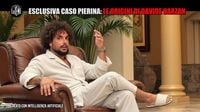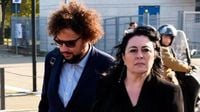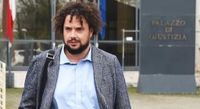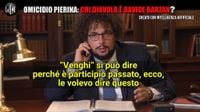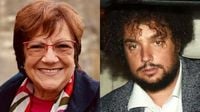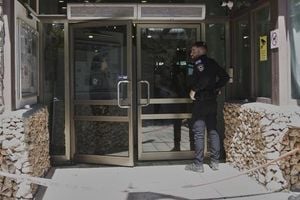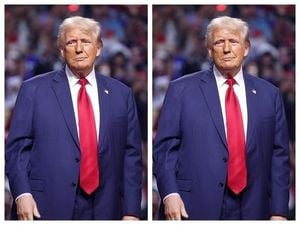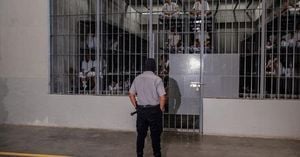In a shocking turn of events, the figure of Davide Barzan has come under intense scrutiny following a recent report aired on the Italian investigative program Le Iene. The segment, produced by Gaston Zama and Marco Occhipinti, delves into Barzan's dubious claims of being a law expert, casting doubt on his credibility as he is embroiled in the high-profile murder case of Pierina Paganelli.
Pierina Paganelli, a pensioner, was brutally murdered in her garage in Rimini, suffering 29 stab wounds. The investigation has drawn attention to Barzan, who has positioned himself as the legal consultant for Manuela Bianchi and her brother Loris, both of whom are connected to the case. However, accusations have surfaced that Barzan has been misleading about his qualifications, with Valeria Bartolucci, the wife of the main suspect Louis Dassilva, alleging that he presented himself as a lawyer despite not being registered with any legal authority.
During the Le Iene broadcast, Bartolucci claimed that Barzan suggested questionable legal strategies, including convincing Dassilva to confess to the murder, knowing he was innocent, and finding a drug addict willing to take the blame for a fee of 5,000 euros. Barzan, when confronted, admitted, "I am not a lawyer. If I made a mistake, I will answer for it. Do I have a law degree? I won’t answer that." This admission has raised further questions about his legitimacy.
Barzan's past is marred with allegations of fraud and deception. Reports reveal that he had previously claimed to have won 47 million euros in the Superenalotto lottery and had promised jobs in a bank in exchange for money. However, these claims were later proven false. Three men from Cosenza have come forward, stating that Barzan defrauded them between 2010 and 2011, presenting himself as a millionaire and aspiring politician while soliciting funds for various dubious ventures.
One of the victims, Vincenzo Iurillo, recounted giving Barzan 4,000 euros for a promised job for his niece, which never materialized. Another victim, Francesco Di Lauro, shared that he had accompanied Barzan on trips across Italy, believing he would secure a position as a sports director for Cosenza Calcio, a promise that also went unfulfilled. Collectively, these men claim to have lost around 50,000 euros to Barzan, who, after they sought repayment, accused them of extortion, leading to their wrongful arrest.
During the investigation, Barzan allegedly displayed a bank statement indicating a balance of 19 million euros, a document later found to be fraudulent. Additionally, his supposed Superenalotto winnings were confirmed to be fictitious, and the luxury vehicles he paraded were rented, not owned.
In 2023, Barzan was convicted of fraud for using a false 2 million euro check to open a bank account, resulting in a six-month suspended prison sentence. Despite this conviction, he continues to present himself as an expert in legal matters, which has drawn the ire of those who feel deceived by him.
Dolores Bevilacqua, a member of the Italian Parliament from the M5S party, has taken notice of Barzan's frequent appearances on public television, demanding clarification on the criteria used by Rai in selecting guests. Bevilacqua's inquiry focuses on whether Barzan's professional qualifications were verified and what measures will be taken to prevent similar situations in the future. She stated, "We ask Rai to clarify what criteria are adopted in the selection of guests involved in judicial cases, whether Barzan's declared professional titles have been verified, and if there have been compensations or contractual agreements with him. Furthermore, we ask if the company intends to review what happened and adopt measures to avoid similar situations in the future. Public service has a duty to ensure balanced and verified information. It is unacceptable that controversial figures, lacking verified qualifications, are presented as experts on such delicate cases."
The fallout from the Le Iene report has been significant, with many questioning how Barzan has managed to maintain his public persona amidst serious allegations. The investigation has prompted renewed interest in his past, revealing a pattern of deceit that has left a trail of victims. One victim expressed frustration, stating, "When I see him on TV, it makes my blood boil. He has made many people cry. Yet he continues to tell stories on camera. We hope someone finally recognizes who he really is."
As the investigation continues, the implications of Barzan's actions extend beyond his personal life, raising questions about the integrity of public broadcasting and the responsibility of media outlets to verify the credentials of their guests. The public's trust in these platforms hangs in the balance as they grapple with the reality of a man who has portrayed himself as an expert while concealing a checkered past.
In summary, the story of Davide Barzan serves as a cautionary tale about the importance of due diligence in the media and the potential consequences of allowing unverified individuals to take center stage in serious discussions. The ongoing discussions in parliament and the public outcry signify a growing demand for accountability and transparency in the selection of experts presented to the public.
